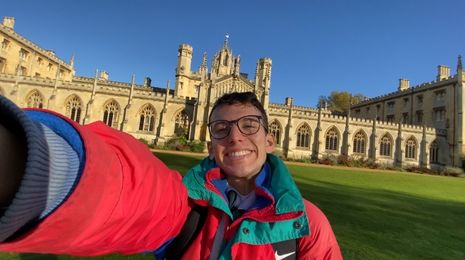Desafio do gringo: Andrew Collet on being a recovering perfectionist
Indya Mason speaks to undergraduate polyglot Andrew Collet of YouTube channel ‘Andrew o Gringo’ about how to beat perfectionism in language learning

In April, Cambridge undergraduate and polyglot Andrew Collet started his YouTube channel Andrew o Gringo, where he posts unedited videos of him speaking Portuguese, inviting native speakers to correct his language in the comments. Four months and over 1,600 comments later, Collet’s proficiency has massively improved, his vocabulary infused with idiomatic expressions collected along the way from kind strangers.
What drew you to study languages at Cambridge?
I always loved languages at school, so I studied French, Spanish, Latin, and Ancient Greek. I think it was just a love of communicating. I also think it was something innate in me. I grew up only speaking English, but I made a friend at church when I was six who spoke Spanish, and I would always ask her how to say things in Spanish.
How many languages do you speak?
I speak English natively, and then French and Spanish to a near native level (C2). I speak Italian fluently, but not quite as fluently as French as Spanish (C1). I probably speak Portuguese at the B2 level and Catalan at B1.
″One lesson I’ve really learned this year is that a lot of the time, people are a lot nicer, and more willing to help, than you think″
There is something boldly unfiltered about your videos – no editing, no performance polish. What’s the strategy behind this?
Well, I have two YouTube channels. The original one was to document my time at Cambridge. Then my second one is one I recently made called Andrew the Gringo (which translates as Andrew the foreigner), and it documents my Portuguese language learning journey. To my core, I’m a perfectionist. When I started with my first YouTube channel, I really carried this through, and I wanted to edit everything perfectly.
So, with this channel, I wanted to detach from the need to be perfect – which is very difficult, being a Cambridge student and perfectionist! I just thought, well, I’m not doing this to get a lot of views. I’m not doing this to be famous or to have perfect content. I was inspired by another channel where someone posted one video in French every day until he was fluent. Nothing was stopping me from doing the same thing. YouTube is free. I’m quite an open person; I don’t mind talking about my life online. I also wanted to motivate myself to keep practicing Portuguese, a way of holding myself accountable.
Is it paying off to be brave?
I definitely would say so. It’s funny, because I started this channel with very low expectations. I was surprised by how much attention it received. It feels like a very privileged position to be in, because I honestly was not expecting to receive so much love and support. I think one lesson I’ve really learned this year is that a lot of the time, people are a lot nicer, and more willing to help, than you think.
Can you see a difference in your fluency after four months?
Looking back, it almost seems like a different person speaking! I think the fact that I upload a video every single day helps – it means that if, let’s say, someone teaches me a new word on day three, I could end up using it every day after. So now it’s just completely embedded in my vocabulary. It’s funny to look back and pick up on grammar mistakes that are so obvious to me now.
″Such a big part of language learning is being embarrassed″
What would you say to people who feel embarrassed trying to learn a new language?
It’s normal! Such a big part of language learning is being embarrassed. There’s so many stories I have of, you know, not getting the joke when you’re speaking to natives, or being in class and you don’t really know what’s going on, and it can feel really shameful. I think the first step would be to just accept that you are going to make mistakes, and that’s the way that you learn. I think a really good skill is learning to laugh at yourself when you make a mistake. I would recommend recording and listening to yourself back; get used to hearing your own voice.
Above all, be kind to yourself. Allow yourself the margin of error, surround yourself with supportive friends and accept that it’s all part of the process!
 News / Colleges charge different rents for the same Castle Street accommodation2 March 2026
News / Colleges charge different rents for the same Castle Street accommodation2 March 2026 News / King’s hosts open iftar for Ramadan3 March 2026
News / King’s hosts open iftar for Ramadan3 March 2026 Theatre / Lunatics and leisure centres 4 March 2026
Theatre / Lunatics and leisure centres 4 March 2026 News / Angela Merkel among Cambridge honorary degree nominees27 February 2026
News / Angela Merkel among Cambridge honorary degree nominees27 February 2026 News / News in Brief: waterworks, wine woes, and workplace wins 1 March 2026
News / News in Brief: waterworks, wine woes, and workplace wins 1 March 2026








